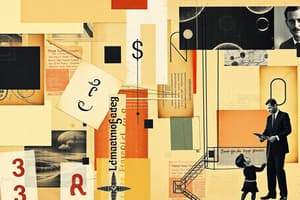Podcast
Questions and Answers
Budgets are the same as budgeting.
Budgets are the same as budgeting.
False (B)
What is a budget?
What is a budget?
A budget is a plan covering all phases of operations for definite periods in the future.
Which of the following is NOT an objective of budgetary control?
Which of the following is NOT an objective of budgetary control?
- To encourage financial waste (correct)
- To compare with planning
- To establish a system of control
- To motivate employees
What is an advantage of budgetary control?
What is an advantage of budgetary control?
What is a disadvantage of rolling budgets?
What is a disadvantage of rolling budgets?
What is a Cash Budget?
What is a Cash Budget?
What is the purpose of a budget committee?
What is the purpose of a budget committee?
A budget center is a department identified for _____ control.
A budget center is a department identified for _____ control.
Flashcards are hidden until you start studying
Study Notes
Budget Definition
- A budget is a plan for all aspects of an organization's operations, covering a specific period of time.
- It represents a formal expression of top management's plans, policies, objectives, and goals.
Budgetary Control
- Involves using budgets and reports to coordinate, evaluate, and control daily operations in alignment with budget goals.
- Constantly compares actual results to budgeted goals.
Budget vs. Budgeting vs. Budgetary Control
- Budgets represent individual departmental objectives.
- Budgeting is the process of setting budgets.
- Budgetary control encompasses all of these, including planning budgets and utilizing them as a comprehensive management tool for business planning and control.
Objectives of Budgetary Control
- Compare actual performance with planned performance.
- Communicate ideas and plans.
- Coordinate activities.
- Establish a control system.
- Motivate employees.
- Communicate with all stakeholders.
- Control all organizational activities.
Advantages of Budgetary Control
- Defines organizational objectives and departmental goals.
- Reveals deviations from budget goals, highlighting areas of success or shortfall.
- Provides centralized control.
- Indicates the efficiency of departmental coordination.
- Provides a basis for taking corrective actions to address negative trends.
Limitations of Budgetary Control
- Risk of inaccurate estimates.
- High cost of implementation.
- Human factor variability.
- Time-consuming process.
- Not a substitute for effective management.
- Risk of over-budgeting.
- Can mask underlying inefficiencies.
Essentials of Effective Budgeting
- Support of top management: Top management needs to be fully committed to the process.
- Teamwork: Collaborative effort from all departments is crucial.
- Realistic objectives: Goals need to be achievable and aligned with organizational strategies.
- Structure of Budget Team: Clear roles and responsibilities within the budget team are important.
- Well-defined Business Policies: Consistent policies ensure alignment and accountability.
- Integration with Standard Costing System: Integrating budgeting with cost accounting systems enhances accuracy and control.
- Inspirational Approach: Motivating employees to contribute to budget goals is vital.
Organizational Chart
- Defines the roles of executives responsible for fulfilling organizational objectives.
Rolling Budget
- A rolling budget is a 12-month plan, revised regularly, typically every quarter.
- Aims to improve forecasting accuracy and flexibility in responding to changing circumstances.
Advantages of Rolling Budgets
- Regular reassessments ensure greater realism and accuracy.
- Reduced uncertainty by incorporating latest updates.
- Planning and control based on a recent, updated plan.
- Continuous budgeting, extending several months ahead.
Disadvantages of Rolling Budgets
- Time-consuming and expensive due to frequent revisions.
- Can be burdensome for managers dealing with multiple revisions.
- Each revision potentially needing adjustments to standards or stock valuations.
Budget Classification based on Function
- Cash Budget: Focuses on cash inflows and outflows.
- Sales Budget: Projects sales volume and revenue.
- Production Budget: Plans production levels to meet projected sales.
- Material Budget: Forecasts material requirements.
- Labor Budget: Estimates labor needs and costs.
- Overhead Budget: Predicts indirect costs.
Budget Terms
- Budget Center: A department within an organization designated for budgetary control.
- Budget Manual: A document that provides guidance on budgeting and budgetary control.
- Budget Committee: A committee responsible for coordinating and reviewing budgeting programs.
- Budget Period: The timeframe covered by the budget.
- Budget Key Factor: A limiting factor that influences budget preparation.
- Budget Report: Compares actual performance against budgeted targets.
Zero-Base Budgeting
- Evaluates each activity from zero, requiring justification for each expenditure.
- Designed to eliminate unnecessary spending and prioritize resource allocation.
Studying That Suits You
Use AI to generate personalized quizzes and flashcards to suit your learning preferences.




